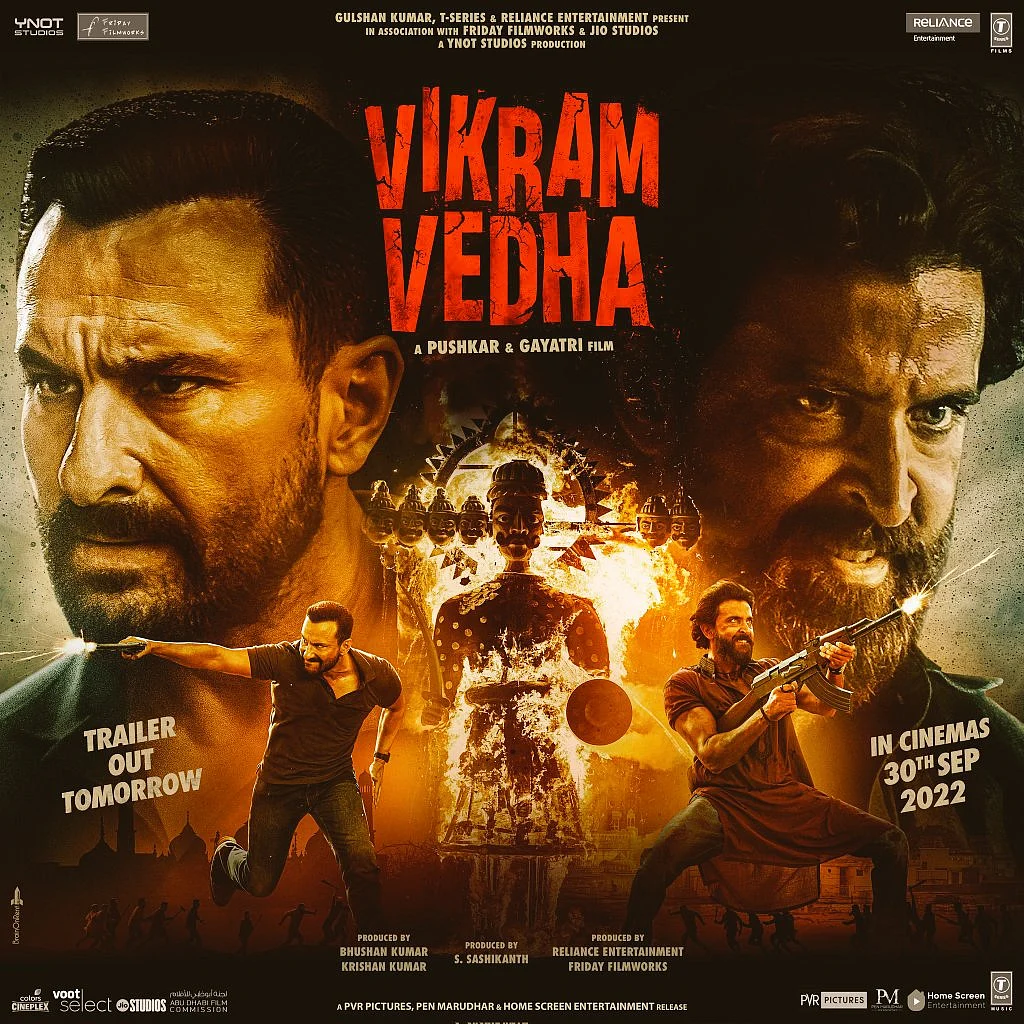Vikram Vedha: Nothing is what it seems
Gayathri and Pushkar transplant their 2017 Tamil thriller, as it is, to UP than transform it in any way to suit the new setting and the changed times. Yet there is no letup in entertainment

My introduction to Gayathri and Pushkar’s cinema happened through Suzhal: The Vortex, an Amazon Prime Video web series created and written by them. Its twists and turns and the beguiling narrative drove me to check out their 2017 Tamil thriller Vikram Vedha. Both these works draw strength from something very basic and essential yet largely missing in contemporary Hindi mainstream cinema—smart, clever writing that stays two steps ahead of the viewer.
A plot which keeps us guessing, red herrings that deceive to please, threads that connect and mesh to make for a layered storytelling and pack in a punch in our eventual arrival at the truth. Watching the duo’s two films feels like piecing together and solving a puzzle—an engaging and immensely satisfying one at that.
In Vikram Vedha they reimagine the lore of Baital Pachisi in the framework of contemporary crime. King Vikramaditya is turned into cop Vikram out to capture criminal Vedha who tells him three stories— “Ek kahani sunayein?” —that go back to their own past and pan out like riddles. Each time Vikram comes up with a correct answer, Vedha lets him go, even as he himself escapes the cop’s clutches. But, more than that, with each one of the stories, he manages to challenge and puncture Vikram’s rigidly defined notions of right and wrong, good and bad and white and black and his conviction of “nothing in between”. He obliterates the straight line that Vikram tends to draw to separate the world of crime from that of law and, along with him, takes the viewer into the heart of moral ambiguities and dilemmas. Aren’t cops and criminals two sides of the same coin?
It also holds Vikram’s own killings of goons to question. Can someone who sleeps well after an encounter because he thinks he hasn’t killed anyone innocent, be so sure of himself? Can he truly make out and separate the guilty from the innocent? Or for that matter Ram from Ravan, chooha (mouse) from billi (cat)?
The Hindi remake doesn’t just retain the original title but is also built on the same idea — “nothing is what it seems”. However, while transplanting the forerunner from Chennai to Lucknow, it does little to transform it in any significant way to suit the new setting and the changed times. Even, the number of killings of Vikram and Vedha remain the same (16, 18), as do gestures like the way Vedha cups the face of his younger brother Shatak.
The alterations are few and far between—UP police dogs eat kachoris (no I am not joking), the key device of mutton chop/curry becomes kulcha-nihari here. However, most changes remain cosmetic at best. For example, Vikram’s colleague Simon of the Tamil version is named Abbas in the Hindi version, but the character arc doesn’t get grounded any deeper in his identity. The nod to Shaktimaan and the use of Raj Kapoor songs might stoke nostalgia but doesn’t rise above being gimmicky. Lucknow and Kanpur, apart from a few generic shots, feel more like sets than actual throbbing UP towns, including the passing shot of the famous Sharma tea stall.
At one level it feels a trifle lazy, imprudent, hurried, and underwhelming filmmaking, specially at a time when the original and its dubbed versions are freely available online. Having said that there is no letup in entertainment either. Vikram Vedha is highly watchable, perhaps one of the most enjoyable Hindi films this year, even if you have seen the original. There is certainly a lot more to savour for an audience that is totally new to the universe of this brotherhood.
Much of it has to do with some sharp dialogue and the familiar starry turns by the likes of Radhika Apte, Sharib Hashmi, Satyadeep Mishra, and, most so, Sudhanva Deshpande as IG police, besides Saif Ali Khan and Hrithik Roshan in the lead roles. Khan and Roshan spar just as well as they duel. However, while Khan looks spaced out and stolid in some portions, Roshan feels too polished, despite the uber hirsute look, to come close to a UP don, with the accent slipping at times. But their inherent swag and macho ways make things coast along.
Devil lies in the details, says Vikram in a scene in the film. It’s interesting how the film maps the particularities. Like the materialism of Shatak’s girlfriend Chandana and its repercussions. Or the scene in the car with Vedha sitting on the seat behind while trying to talk to Vikram, a witty approximation of the iconic image of Betaal riding on the back of Vikramaditya.
Eventually it all boils down to the strength of the original concept, the well-etched, ethically complicated characters, the fast-moving action, and lithe camerawork and the loud but pulsating theme music, an integral attribute of and instant identifier for the film.
Follow us on: Facebook, Twitter, Google News, Instagram
Join our official telegram channel (@nationalherald) and stay updated with the latest headlines
